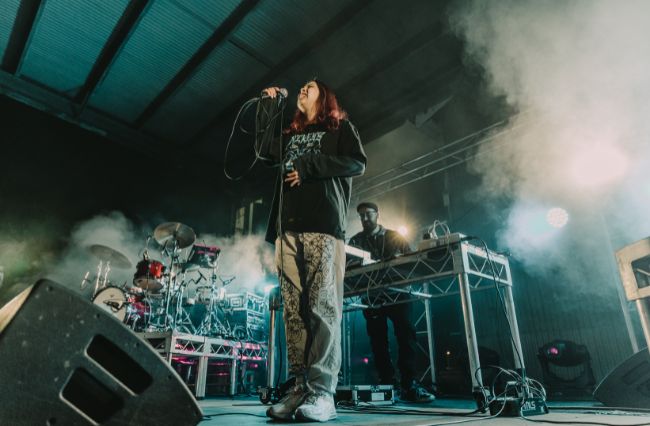“Art has saved me, and it’s helped me to take something painful and make it into something that is tangible and say, ‘This is how I feel’.”
Grace Chia, a Tasmanian-based musician, is one of the emerging artists from a new wave of Australian hip-hop. Chia has been writing and releasing songs for years and now has a debut album, Mars Apollo, set for release in mid-2023.
Her take on the genre explores themes unlike the usual money, sex, and grind that many have come to associate with hip-hop. Instead, Chia speaks on empowerment, womanhood, and mental health. She’s entered the scene at a time where the industry has become more malleable than ever, making it the perfect time for her to bring her uniquely poetic and impactful style to the stage.
Inspired by her experiences as a woman in the Australian hip-hop scene, Chia talks about womanhood in her music, and sheds light on her lived experiences of women in ways not often heard in hip-hop.
“Whilst I actually have it really good here and a lot of Australian women have more rights than most women, there is so much change that needs to be fought for,” she said.
“There’s many voices that aren’t heard, so I want to bring those causes and those problems into hip-hop spaces so they’re brought into mainstream media. They’re easily digestible through music, and they can be related to by many people who feel like they don’t have a voice or feel like they’re not heard.”
Chia’s latest song is named after Mahsa Amini, a twenty-two-year-old Iranian woman who died under suspicious circumstances after being taken into custody by the morality police for incorrectly wearing a hijab.
“I can remember when the news articles were coming out… I just felt infuriated, I felt helpless,” she said.
“At times in my life where I feel like my life’s out of control, or that there are things happening in the world that are out of my control, but I’m really upset about or I want to change, I always turn to art in some kind of form.”
Chia says that expressing her hardships through music has helped her to process and grow from those moments in her life.
“Through my adolescence and young adulthood, I’ve really struggled with mental health, and art has always been there through that,” she said.
“I think that’s ultimately what I love about art, we have feelings that words just don’t describe or don’t do justice, and sometimes art is the only way to articulate it.”
While her album, Mars Apollo, will be released soon, Chia said that she’s faced several challenges breaking into the industry, from trying to stay true to herself, to being a woman in a male dominated field.
“There is such a crazy pressure from the industry to be a certain look or a certain type of music or you won’t make it,” she said.
“But I think for myself, if I want to make it big, I want to be big doing me.”
Chia notes that she used to be one of the only single women at the events she would attend and perform at, and most other women present were partners of the men attending those gigs. As a result, she often felt as though there was an “imposing attitude” towards her.
“For some reason, I felt like people just didn’t expect you to be there because you like the music or you were there to perform,” she said.
Over time, Chia has seen more diversity entering the scene, as well as a wider variety of sounds being experimented with by Australian artists.
“I think it’s really interesting how the Australian hip-hop scene has shifted over time, nowadays we have so many sub-genres,” she said.
“But I think now it’s really exciting to see more multicultural aspects of hip-hop in Australia, there’s a really big growing First Nations hip-hop scene, there’s a lot more women who are killing it.”
Additionally, living in Tasmania has given Chia a unique network The he industry is also far less saturated than bigger cities across Australia – something that Chia appreciates.
“Because we are an island and we’re secluded from the world, there’s a really close-knit scene,” she said.
“In Tasmania, we all know each other, we help each other out, we share each other’s things, we give each other input and advice, and I think that’s super rare. That’s something you won’t get in a big city, in a place where almost every second person makes music.”
As the industry continues to grow in popularity, Chia brings a fresh take on Australian hip-hop by addressing complex societal issues with nostalgic 90’s inspired beats and using her platform to give a voice to people from all walks of life.
“I aim to talk on problems in the world and problems that people deal with that are not often voiced, especially in hip-hop spaces, and to bring that into a space of encouragement where everyone feels welcome.”
Her upcoming album, Mars Apollo, aims to empower people to “disconnect from the Matrix” and instead focus on the beauty that life has to offer.
“It’s about unplugging from the pressures of the world, unplugging from the constant drive and hustle to make money or be successful, but to put focus on your happiness, your connections with people, and the land and yourself as well,” she said.
Article: Gemma Dimitrijevski is a Bachelor of Media and Communications (marketing) student at La Trobe University.
Photo: Image by Aiesha Hanson. This image has not been modified.







